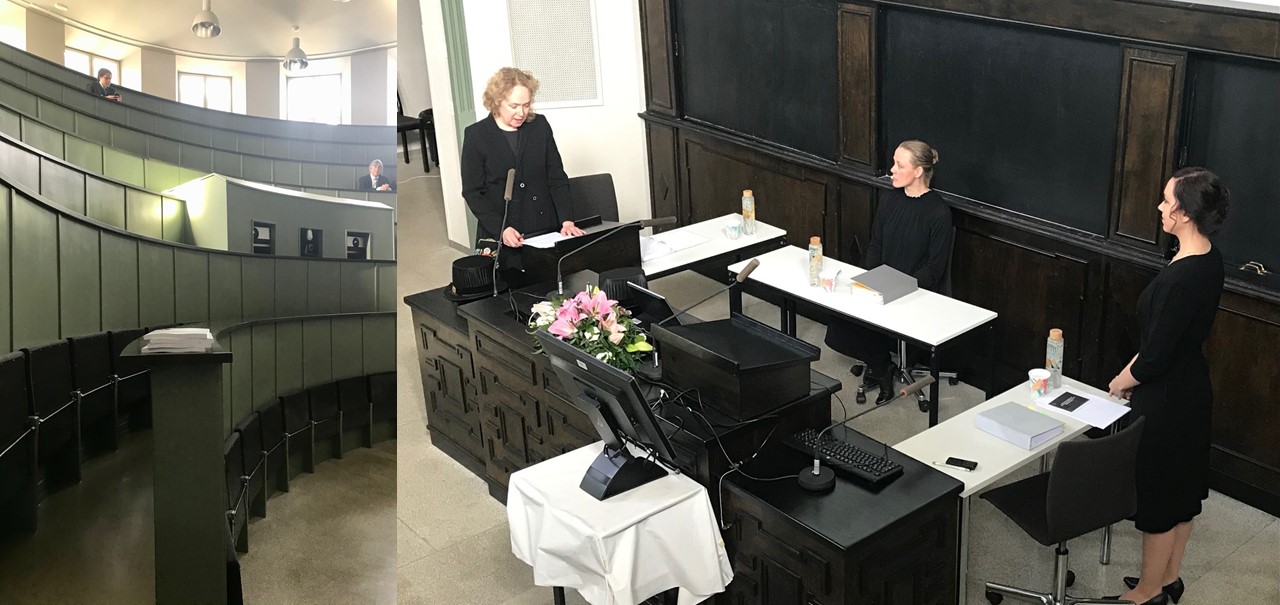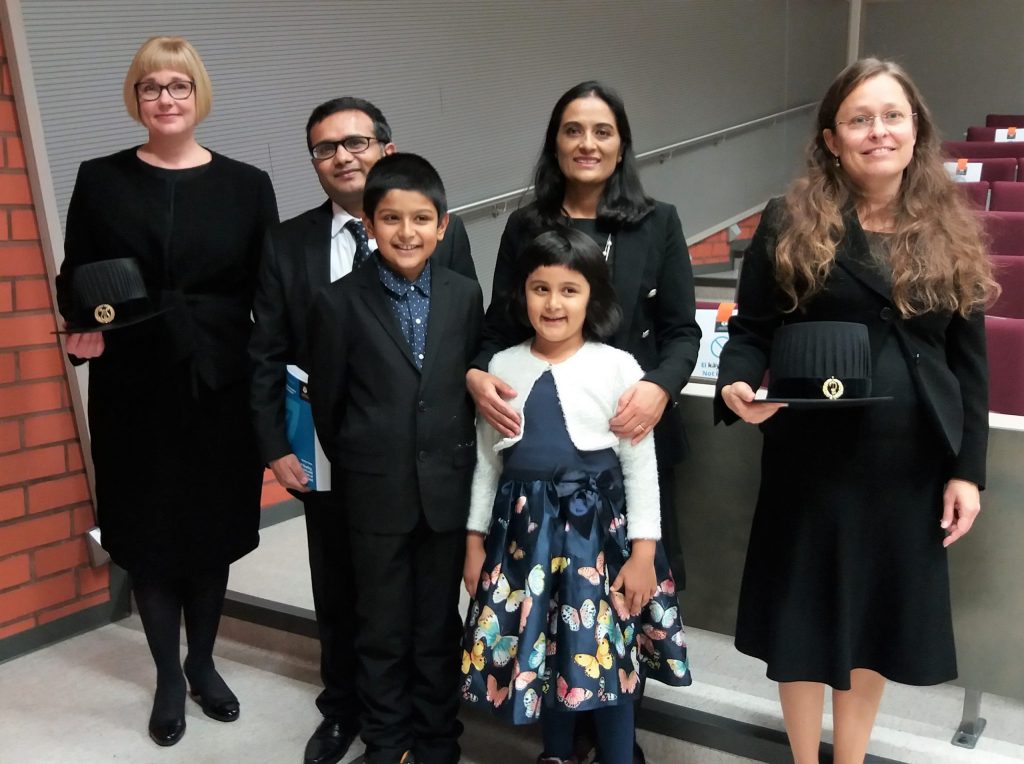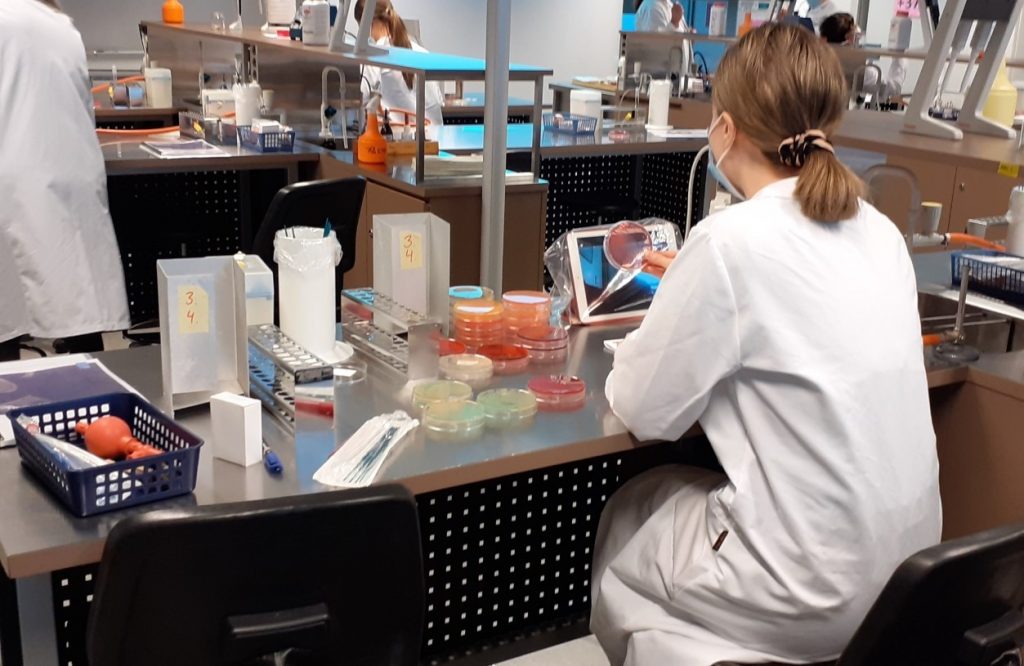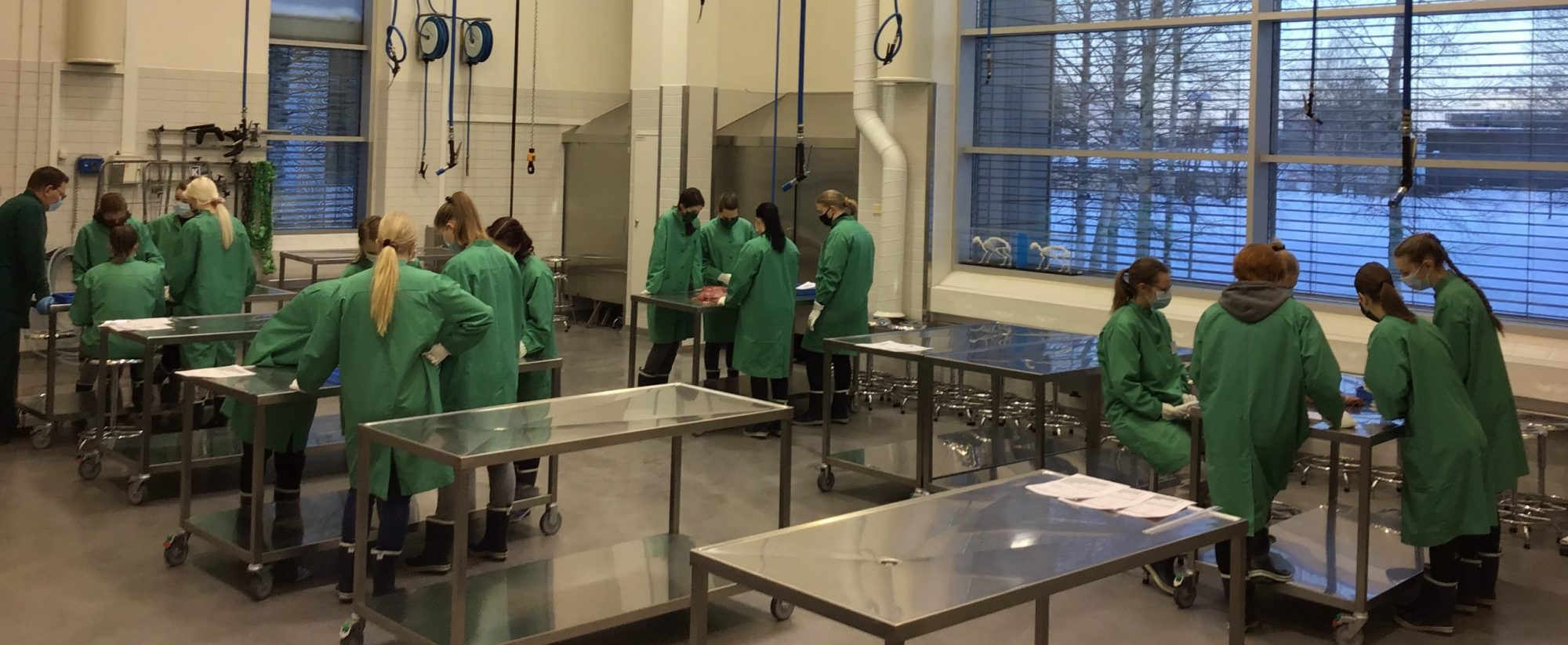The year 2020 gave us a taste of the new normal. The Covid-19 pandemic overhauled the way we work and moved our interaction online. Many important events were cancelled or organised remotely. A year is a short time in the history of our department, but 2020 will likely have a permanent impact on the way we teach and work. The exceptional arrangements were stressful for the staff, but I am pleased to state that, despite the challenges, 2020 was in many ways a good year. Personal digital advances and successes in remote teaching and research demonstrate the perseverance, dedication and community spirit of the staff. Below is a summary of some of the most important events in the disciplines in 2020.
Elina Säde
Director, Department of Food Hygiene and Environmental Health
Faculty of Veterinary Medicine
University of Helsinki

Academic traditions had to be adapted to the exceptional circumstances. The audience followed the public examination of Mariella Aalto-Araneda’s (right) doctoral thesis via remote links on 25 March 2020. The opponent was Docent Jaana Husu-Kallio (left), and the custos was Professor Miia Lindström (centre).
Environmental health control
Janne Lundén was appointed associate professor of risk management in food safety on 1 January 2020. His group’s research focuses on the impact of food control, and the topics relate to the prevention of food fraud, the functioning of the system for publishing food control information, the public health impact of food control, and the enhancement of risk management in the food sector. In 2020 the group also began to explore the effects of coronavirus on food control and risk management in the food sector. The group concluded a two-year project on the effect of certified food safety systems on food safety. The project results have already been used in outlining Finnish guidelines for using food safety systems in food control. Supervised by Professor Emeritus Hannu Korkeala and Janne Lundén, Mariella Aalto-Araneda, LVM, completed her doctoral thesis on the control of Listeria monocytogenes in the fish industry and defended the thesis at a public examination. The thesis demonstrated that food control measures are connected to the safety of products from fish-processing plants. Janne Lundén served as the deputy director of the Doctoral Programme in Food Chain and Health. His partner in the discipline was Katri Kiviniemi.
Environmental health
Tarja Pitkänen, the new tenure-track associate professor of environmental health, took up her position (40%) at the beginning of October. University Lecturer Rauni Kivistö continued as the discipline coordinator of environmental health. Ananda Tiwari, MSc, defended his doctoral thesis entitled Monitoring microbial quality, contaminant sources and bacterial communities of bathing water in Finland at the University of Eastern Finland on 30 October 2020.

Tarja Pitkänen (left), the new associate professor of environmental health, and Rauni Kivistö (right), university lecturer of environmental health, crossed paths at the public examination of Ananda Tiwari’s (centre) doctoral thesis at the University of Eastern Finland. Tarja served as the custos and Rauni as the opponent. The successful public examination may be a sign of future cooperation at the University of Helsinki.
Teaching in environmental health continued to take place via remote connections, and only laboratory assignments were completed through contact instruction for small groups. Rauni published four international peer-reviewed publications with national and international partners and presented her group’s results related to liver as a high-risk food product for campylobacteriosis at the Annual Veterinary Congress. Tarja Pitkänen spoke about waste water monitoring associated with coronavirus at the Finnish Food Authority’s laboratory news session, the Finnish environmental health seminar and a town hall meeting entitled ‘SARS-CoV-2 Monitoring Employing Sewers – From an EU Umbrella to a Sentinel System’. Urszula Hirvi, the long-serving senior laboratory technician in environmental health, retired in September 2020.
The virus research group led by Docent Leena Maunula participated in a cross-disciplinary collaboration project investigating the ways in which the SARS-CoV-2 virus spreads. The research conducted by the Faculty’s zoonosis virus group and Aurora Díaz Pérez sought to increase our understanding of how viruses are transmitted through surfaces. Leena Maunula spoke at a virtual event supporting Covid-19 research at Think Corner in June. Doctoral student Emil Loikkanen contributed to arrangements for tests exploring how disinfectants destroy viruses on surfaces. The group’s collaborative research on the VHS virus in fish was concluded with Pia Vennerström of the Finnish Food Authority defending her doctoral thesis on the topic.
Food and environmental toxicology
As was the case more generally at the University, the discipline of toxicology adopted mostly remote work arrangements as a result of the pandemic. Just before the discontinuation of contact instruction in early spring, our department hosted David Dorman, a professor of toxicology at the Department of Molecular Biosciences, North Carolina State University, who gave a seminar on the application of systematic review methods in evaluating phthalate-induced male reproductive toxicity. He was scheduled to give a talk at the Veterinary Teaching Hospital later in the spring and provide teaching at the Faculty of Pharmacy, but the plans were scrapped due to the pandemic. The global pandemic also led to the cancellation of many significant international scientific conferences, such as the EUROTOX Congress and the AHR symposium. The need to travel was also reduced because the assessment procedure of grant applications by the Slovenian Research Agency, in which Professor Raimo Pohjanvirta has participated numerous times in Ljubljana, was conducted online this year. Pohjanvirta served as visiting editor in a special issue on dioxin toxicity mechanisms of the International Journal of Molecular Sciences, a follow-up to a similar special issue published by the same journal a few years ago, which was also edited by Professor Pohjanvirta.
Meat inspection and slaughterhouse hygiene
In the spring, instruction in slaughterhouse hygiene was swiftly moved online. In the autumn meat inspection course, Riikka Laukkanen-Ninios and Eija Kaukonen succeeded in organising most of the laboratory work as contact instruction for small groups. Veterinary inspector traineeships had to be organised remotely or replaced with separate assignments. The organisation of traineeships has been hindered not only by the Covid-19 pandemic, but also by the large number of students compared to the number of slaughterhouse traineeship positions available. Changes to veterinary inspector traineeships were discussed within the Faculty and with the Finnish Food Authority and the Ministry of Agriculture and Forestry.
Professor Maria Fredriksson-Ahomaa’s research focused in 2020 on zoonotic pathogens in game animals and game meat as well as their significance for public health, whereas Riikka Laukkanen-Ninios concentrated on the reform of meat inspection in a European COST-funded project titled Risk-based meat inspection and integrated meat safety assurance.
In early February, Associate Professor Nevijo Zdolec of the University of Zagreb, hosted by Maria Fredriksson-Ahomaa, visited our department for a week to learn more about teaching and research on meat inspection. At the beginning of the year, Fredriksson-Ahomaa took up the position of inspector of the EKY student association.
Food hygiene
The highlights of Professor Johanna Björkroth’s group in 2020 included longitudinal research on the meat spoilage process, which demonstrated that the growth stages of spoilage microbes can be detected with transcripts. The group’s goal is to develop new methods for measuring spoilage, thus preventing food waste. The Novo Nordisk Foundation awarded Johanna a Distinguished Investigator grant. This major grant (€1.4 million) will be used to promote research on the microbiological spoilage of food. Johanna presented her research results at virtual conferences and served as an expert on panels and working groups.
Professor Miia Lindström’s group continued its commendable research on the Clostridium botulinum bacterium and the neurotoxin it produces within projects funded by the European Research Council (ERC) and the Academy of Finland. The botulinum researchers participated in a virtual conference, and the botulinum laboratory excelled under the supervision of Katja Selby in a proficiency test organised by EuroBioTox. The group of botulinum researchers grew when Postdoctoral Researcher Olivia Lanzoni joined them. The LiSTOPtimation project (2018–2022), funded by the Finnish Development Fund for Agriculture and Forestry (Makera), explored the transmission routes of Listeria monocytogenes and its persistence in the food chain through whole-genome sequencing. Hanna Castro reported on the project results at a virtual conference.
Assistant Professor Annamari Heikinheimo’s Zanres (Zoonotic Antimicrobial Resistance) research group welcomed several new members in 2020, including doctoral student Venla Johansson, LVM, and Postdoctoral Researcher Banafsheh Khakipoor as well as Nigerian veterinarian Ahmad Al-Mustapha, who visited the group. Doctoral student Paula Kurittu participated in a researcher exchange to Wageningen in the Netherlands in early 2020, and Doctoral Student Marie Verkola helped organise an international meeting in Helsinki in connection with the Erasmus+ project Learning Genomics for Food Safety, hosting partners from Italy, Poland and Spain. Towards the end of the year, the group received funding from the Academy of Finland to determine and explore antibiotic-resistant bacteria in waste water.
Professor Emeritus Hannu Korkeala was invited to become a member of the Latvian Academy of Sciences. Anniina Jaakkonen, MSc (Tech), defended her doctoral thesis entitled Genomic epidemiology of Shiga toxin-producing Escherichia coli and Campylobacter jejuni on dairy farms and in raw milk at a public examination held on 2 June 2020. The thesis was supervised by Marjaana Hakkinen (Finnish Food Authority), Saija Hallanvuo (Finnish Food Authority) and Professor Miia Lindström. The doctoral thesis by Mirjami Mattila, LVM, entitled Stress response mechanisms in Listeria monocytogenes, was examined on 10 December 2020 (approved in 2021). Professors Hannu Korkeala and Miia Lindström served as the thesis supervisors.
Teaching in food hygiene was primarily provided through remote connections. In laboratory work, safety regulations were followed, and a hybrid model was tested in which students successfully completed an assignment remotely in pairs. Katja Selby and Hanna Castro deputised for Miia Lindström, and Elina Jääskeläinen supported the university lecturers during the course.

Laboratory teaching followed strict safety regulations, and a hybrid model in which students completed an assignment remotely in pairs through online connections was tested.
